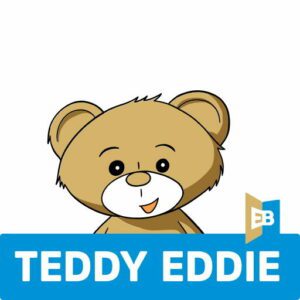What is Teddy Eddie?
Teddy Eddie is a licensed method of teaching English to 2 to 7-year-old children. It was created when three mums – who are also methodologists – were unable to find a teaching proposal for preschoolers that met all their requirements. The Teddy Eddie method combines:
- a thoughtful, content-based lesson plan;
- material and a way of teaching that arouses little kids’ curiosity and engagement;
- guidelines for maintaining the teaching standards that mean teachers can conduct lessons with ease and freedom.
Why is our method so effective?
Teddy Eddie focuses on communication. The lessons are organised so that the children have the chance to assimilate many elements of foreign speech in a similar way to the way they learned their mother tongue. English is used in our lessons as a means of communication in commands and instructions as well.
Through repetition and consolidation of the teaching material, our little learners develop language habits. The reinforcement of communicative content with movement and gestures promotes better understanding and memorisation. On top of this, it is also a form of play that children enjoy engaging in, which also has an impact on learning outcomes.






What distinguishes our method?
The Teddy Eddie method is:

Child-friendly
- lessons in small groups
- lots of fun and a child’s sense of humour

Ambitious
- a large vocabulary, always practised in complete sentences
- fully trained teachers

Natural
- focuses on communication
- uses children’s contexts

Reliable
- strictly defined licensing rules
- methodological supervision

Parent-friendly
- open lessons to show your child’s progress
- Practical Guide for Parents in the Education Pack

Developmental
- smooth transitions to the next level
- option of continuing with courses for older children*
What is the course like?
The Teddy Eddie method is based on a variety of teaching techniques. The course book contains a large number of texts in the form of stories, rhymes and songs which provide vocabulary and phrases. This teaches learners to know, understand and acquire sentence contexts, which is very important in language learning. Emphasis is placed on repetition and consolidation as well as listening comprehension. Verbal cues are reinforced in Teddy Eddie lessons through movements and gestures, which is a form of play that little learners are very keen to engage in.

Communication

Learning vocabulary in complete sentences

Collaboration between the teacher and the parent

The start of an ambitious educational pathway
Teddy Eddie is the first of three methods that make up a challenging learning pathway. For older children there are the Savvy Ed and Edward’s League methods. The continuity in the learning process means there is a plan to maintain your child’s high language level and the chance to successfully prepare for and take Cambridge examinations.*.
*Savvy Ed and Edward’s League methods available in selected areas. If they are not available in your country, the Teddy Eddie brand owner, Edu Bears, will advise the language school on alternative courses.

Communication

Learning vocabulary in complete sentences

Collaboration between the teacher and the parent

The start of an ambitious educational pathway
*Savvy Ed and Edward’s League methods available in selected areas. If they are not available in your country, the Teddy Eddie brand owner, Edu Bears, will advise the language school on alternative courses.
The method consists of four levels:

Start 2 to 3-year-olds
First words and sentences

Standard 4 to 5-year-olds
First conversations

ABC 6-year-olds
Early reading

Superhero 7-year-olds
Independent communication
Impact on overall development
Learning a foreign language will affect your child’s overall development: it will stimulate his or her memory, cognitive and communication skills.
Communication benefits
Adequately supported by the teacher, children are eager to attempt to express themselves in a foreign language, without the feeling of embarrassment that often accompanies older learners.
Language development
Younger children are definitely better at mastering the phonological system (i.e. the sounds) of a new language and so they acquire natural English pronunciation and intonation more easily.
The reality of foreign language teaching
Young children learn in a playful, virtually effortless way. They have a positive attitude towards English, and this strengthens their intrinsic motivation and guarantees better results in further learning.
Reviews
Find out what parents and children love about the Teddy Eddie method.
Natalia
3 years old, Teddy Eddie Start
Viktoria
3 years old, Teddy Eddie Start
Klara
5 years old, Teddy Eddie Standard
Natalka
5 years old, Teddy Eddie Standard
Ariana
4 years old, TE Standard
Milena
8 years old, TE Superhero
Olga
5 years old, Teddy Eddie Standard
Natalia
3 years old, Teddy Eddie Start
Viktoria
3 years old, Teddy Eddie Start
Klara
5 years old, Teddy Eddie Standard
Natalka
5 years old, Teddy Eddie Standard
Ariana
4 years old, TE Standard
Milena
8 years old, TE Superhero
Olga
5 years old, Teddy Eddie Standard
A method supported by numbers
14
~ 600
school locations
+ 30 000
Present in
5
countries




The teacher
Teddy Eddie teachers receive induction training in our method before they start teaching. They master all the lesson elements and learn how to plan and then carry out successful and effective lessons. In addition, they are given information on the methods we use for contacting the parents of students.
Lessons are regularly supervised and discussed. Selected lessons are recorded and then watched by our methodologists, so that we can check that they meet the standards of the Teddy Eddie method. In this way, we ensure the highest quality of our courses and the ongoing training of our teachers.


Parents and carers
A very important aspect of the method is the contact between the teacher and the parents or carers, who can count on ongoing information about the group’s progress after each lesson. Every week, parents receive emails with information on the material that has been covered and suggestions on how to consolidate it with their child at home. At the end of each term, the language schools organise demo lessons to show the Teddy Eddie method results. In addition, comprehensive progress reports are prepared for each child.
The most important role of parents and carers in the context of teaching their child is simply to be involved. We know from experience that nothing motivates young learners to learn more than the demonstration of interest in the lesson by their loved ones.
Teddy Eddie at home!
The Teddy Eddie method does not include compulsory exercises to be done at home. However, it is true that children get better results if they are exposed to English outside of school as well as during classes. Even passively listening to songs and stories from lessons has an effect. The child can do other activities during this time – playing with toys, drawing, etc. The important thing is that he or she hears the course content in the background, and this alone influences the learning effectiveness.
Better results
Contact with a foreign language at home improves a child’s performance in the lessons.
Educational play at home
The course texts available to parents mean that language games can be played at home.
Additional hints
We have included tips on home language activities in the Parent’s Guide.


